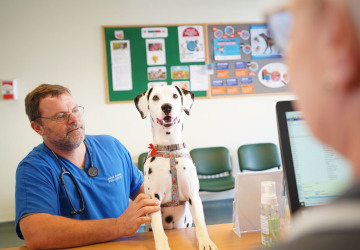
Head nurse Nicola has some important advice on worming dogs
March 7, 2021
Spring is in the air, and worms want to be in your dogs – not a very nice thought, but it’s reality. That’s why it’s so important to protect your dog from worms and the health problems they can cause. Head nurse, Nicola has this advice.
Did you know that your dog could be more susceptible to certain worms depending on their age and ‘hobbies’?
- Very young dogs tend to be at higher risk of picking up roundworm.
- Dogs who scavenge for food increase their exposure to tapeworms.
- Dogs who play with toys in the garden are more at risk of contracting lungworm from the slime of infected slugs and snails, especially if their toys (and food/water bowls) are left out overnight. You shouldn’t let your dog eat slugs and snails either, as lungworm can often be fatal.
As with fleas, you can protect your dog all year round from worms. However, it’s also important to reduce your pet’s exposure to them.
Here’s Caroline’s dog worming advice for spring:
- Make sure your dog’s worm treatments are up to date – we can check when they’re next due.
- Always give your dog the right worming dosage for their weight, again our team can help you with this.
- If you have a puppy or a new adult dog, get them checked by a vet to ensure they don’t already have a case of worms.
- Wash your hands before and after handling your dog, their food bowls, toys, and bedding. This is especially important if you have young children. Also, you should wash your hands after touching worm treatments.
- Try and stop your dog from scavenging as some worms can live on other host animals, including dead ones.
- Ensure your dog is up to date with flea treatments too as fleas can carry some worm infections, so keep an eye out for these parasites as well.
If you’re not sure when your dog is next due their flea and worm treatments, get in touch with our team.






